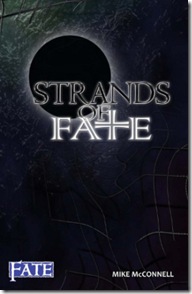 Strands of Fate is a heavily modified version of the FATE rules written by Mike McConnell. The idea behind Strands of Fate was to create a streamlined version of FATE which can be used to run games in any genre. The 471-paged PDF is now available directly from the author for $10 right now, but it should appear on DriveThruRPG soon.
Strands of Fate is a heavily modified version of the FATE rules written by Mike McConnell. The idea behind Strands of Fate was to create a streamlined version of FATE which can be used to run games in any genre. The 471-paged PDF is now available directly from the author for $10 right now, but it should appear on DriveThruRPG soon.
Here’s a list of the changes from “standard” FATE:
-
No Adjective Ladder/Fewer Confusing Terms
In SoF the adjective ladder has been removed, the game directly uses the numerical values instead. Mike also did away with terms like “shifts”, “tag” and “efforts”. The concepts themselves are still there, but more regular terms are used. -
Skills = Abilities + Aspects + Advantages
Skills have been replaced with Abilities (which serve the same function but are much broader). More specific uses of abilities are covered by aspects and special advantages. The abilities are same for all genres, genre-specific concepts are introduced using aspects and advantages, making the core rules genre-agonistic. -
Character Aspects and Specialty Aspects
From the official product page: “Unlike other FATE games, we break a character’s Aspects down into two separate categories; Character and Specialty Aspects. Character Aspects tell you who a character is, where he is from, and what his place is in the world is. Specialty Aspects are more focused; telling you in greater detail what a character is especially good (or bad) at.” -
Persistent Aspects
In Strands of Fate aspects that greatly impact the situation at hand are considered “always on”. You don’t need to pay Fate points to use them. -
Stunts = Advantages
Advantages in Strands of Fate come in three tiers of increasing complexity. Tier 1 advantages usually are described by a single sentence and grant a bonus on a specific ability use. Tier 2 advantages are more complex and usually cost Fate points to use. Tier 3 advantages are basically supernatural powers (like Psionics, Magic, etc.) -
Stress Tracks, Conflicts and Consequences
Strands of Fate uses three stress tracks (Physical, Mental and Social) and has conflict systems for each kind of conflict. There’s also advice for introducing additional stress tracks (Mana or Wealth for example). -
Equipment
Strands offers an additional level of detail on equipment compared to Spirit of the Century (or other FATE games). Some equipment may grant dice roll bonuses or even additional aspects. These rules are optional and advice for simplified weapons, armor and equipment is included.
I haven’t had the time to give it a closer look, but from what I’ve seen it looks pretty promising. For more details on Strands of Fate, please check out the Void Star Games website.

"streamlined"
"471-paged PDF"
LOL!
There core rules are definitely streamlined from standard FATE. The size of the book comes from the fact that it contains a lot of options for different genres and because it's digest-sized.